-
 Bitcoin
Bitcoin $98,028.6276
-2.86% -
 Ethereum
Ethereum $2,741.4245
-2.23% -
 XRP
XRP $2.5228
-7.77% -
 Tether USDt
Tether USDt $1.0003
-0.05% -
 Solana
Solana $207.7760
-3.97% -
 BNB
BNB $574.5915
-5.11% -
 USDC
USDC $1.0000
0.01% -
 Dogecoin
Dogecoin $0.2658
-6.05% -
 Cardano
Cardano $0.7564
-5.18% -
 TRON
TRON $0.2251
-1.04% -
 Chainlink
Chainlink $20.1890
-3.73% -
 Sui
Sui $3.6674
2.70% -
 Avalanche
Avalanche $26.9966
-2.69% -
 Stellar
Stellar $0.3436
-6.22% -
 Hedera
Hedera $0.2544
-4.84% -
 Toncoin
Toncoin $3.8212
-5.33% -
 Shiba Inu
Shiba Inu $0.0...01593
-1.99% -
 UNUS SED LEO
UNUS SED LEO $9.7766
-0.87% -
 Hyperliquid
Hyperliquid $25.3170
-0.29% -
 Bitget Token
Bitget Token $6.5419
-0.58% -
 Litecoin
Litecoin $102.7412
-2.55% -
 Polkadot
Polkadot $4.7830
-5.52% -
 Bitcoin Cash
Bitcoin Cash $333.4988
-3.31% -
 Ethena USDe
Ethena USDe $0.9995
-0.03% -
 MANTRA
MANTRA $5.8465
-3.35% -
 Uniswap
Uniswap $9.2273
-4.10% -
 Dai
Dai $0.9997
0.00% -
 Ondo
Ondo $1.3705
-3.12% -
 Pepe
Pepe $0.0...01020
-3.81% -
 Aave
Aave $270.0897
0.83%
How to avoid slippage when buying and selling BENQI(QI) coins?
When trading BENQI (QI) coins on a decentralized exchange, it's crucial to understand slippage and implement strategies to minimize its impact, such as using limit orders or avoiding trading during periods of high volatility.
Dec 25, 2024 at 08:37 am

How to Avoid Slippage When Buying and Selling BENQI (QI) Coins
BENQI is a decentralized, non-custodial liquidity market protocol built on Avalanche. It allows users to lend, borrow, and swap their assets through a network of liquidity pools. When trading BENQI (QI) coins on a decentralized exchange (DEX), it is important to understand slippage and how to minimize its impact on your trades.
Key Points
- Slippage is the difference between the expected price of a trade and the actual execution price.
- Several factors can contribute to slippage, including market volatility, order size, and network congestion.
- There are several strategies to minimize slippage, such as using limit orders, setting a slippage tolerance, and trading during periods of low market volatility.
Step 1: Understand Slippage
Slippage occurs when a trade is executed at a price that is different from the expected price. This can happen for several reasons:
- Market volatility: When the market for BENQI (QI) is volatile, the price can fluctuate rapidly, which can lead to slippage if the trade is not executed quickly enough.
- Order size: Larger orders are more likely to experience slippage as they can take longer to fill and may require multiple transactions to complete.
- Network congestion: When the Avalanche network is congested, it can slow down the execution of trades and lead to slippage.
Step 2: Use Limit Orders
One way to minimize slippage is to use limit orders instead of market orders. A market order is executed immediately at the best available price, while a limit order is executed only when the price reaches a specified level. By setting a limit order below the current market price for a buy order or above the current market price for a sell order, you can ensure that your trade is not executed at a price that is too far away from your desired price.
Step 3: Set a Slippage Tolerance
When trading on DEXes, you can often set a slippage tolerance for your orders. This is the maximum amount that the price can deviate from your desired price before the order is canceled. By setting a slippage tolerance, you can protect yourself from trades that are executed at an unacceptable price.
Step 4: Trade During Periods of Low Market Volatility
Another way to minimize slippage is to trade during periods of low market volatility. When the market is less volatile, the price is less likely to move significantly during the execution of your trade. This reduces the chances of slippage and gives you more control over the price at which your trade is executed.
Step 5: Use a High-Volume Exchange
Trading on a high-volume exchange can also help to reduce slippage as there will be more liquidity available to execute your trade. Larger liquidity pools make it easier to fill your order at a price that is close to your desired price.
Step 6: Monitor the Network
Before initiating a trade, always check the status of the Avalanche network. If the network is congested, it is best to wait until congestion clears before submitting your order. This will reduce the likelihood of slippage and ensure that your trade is executed quickly and efficiently.
FAQs
Q1. What is the average slippage for BENQI (QI) trades?
A1. The average slippage for BENQI (QI) trades varies depending on several factors, including market volatility, order size, and the DEX being used. However, a slippage of 0.5% to 1% is considered to be a typical average for most trading conditions.
Q2. Can I avoid slippage entirely?
A2. While it is not possible to completely eliminate slippage, there are several strategies that you can use to minimize its impact on your trades. By following the steps outlined in this article, you can reduce the likelihood of experiencing excessive slippage and protect your profits.
Disclaimer:info@kdj.com
The information provided is not trading advice. kdj.com does not assume any responsibility for any investments made based on the information provided in this article. Cryptocurrencies are highly volatile and it is highly recommended that you invest with caution after thorough research!
If you believe that the content used on this website infringes your copyright, please contact us immediately (info@kdj.com) and we will delete it promptly.
- Bitget Token (BGB) Price Prediction 2025, 2026-2030
- 2025-02-05 10:46:01
- Bitcoin Cash (BCH) Shows Remarkable Resilience Amid Market Fluctuations, Experts Provide Wide-Ranging Predictions
- 2025-02-05 10:46:01
- XRP News Today: Ripple Price Hinges on the SEC Development While Whales Make New Moves
- 2025-02-05 10:46:01
- Remittix (RTX) – The Best Coin to Invest Today for Future Growth
- 2025-02-05 10:46:01
- Bitcoin (BTC) Market Has Not Reached Its Peak, Analysis of 5 Key Indicators Show
- 2025-02-05 10:46:01
- Ethereum (ETH), Hedera (HBAR), and Bonk (BONK) See Notable Price Swings Influenced by Market-Wide Liquidations, Institutional Activity, and Whale Accumulation
- 2025-02-05 10:46:01
Related knowledge
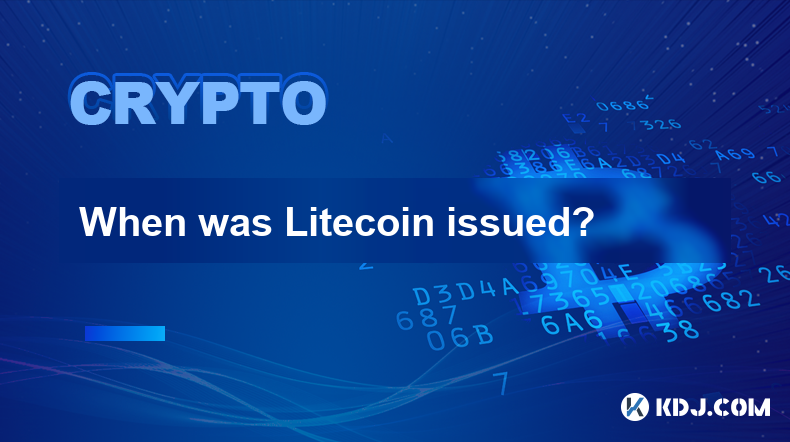
When was Litecoin issued?
Feb 04,2025 at 02:36am
When was Litecoin Issued?Key Points:Litecoin's inception and developmentLitecoin's launch date and market dynamicsLitecoin's technical specifications and key featuresLitecoin's Inception and DevelopmentLitecoin, conceived by former Google engineer Charlie Lee, emerged as a fork of Bitcoin in October 2011. Inspired by Bitcoin's revolutionary blockchain t...
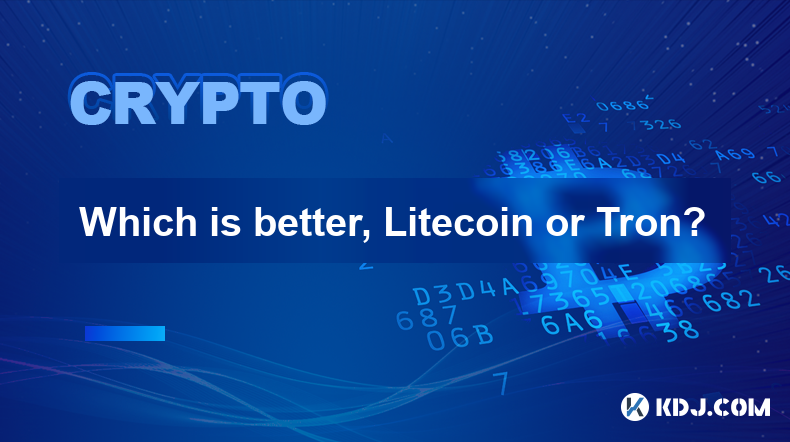
Which is better, Litecoin or Tron?
Feb 04,2025 at 10:30pm
Key Points:Similarities between Litecoin and Tron: Decentralized, open-source blockchain platformsDifferences between Litecoin and Tron: Use cases, consensus mechanisms, transaction speedsFactors to consider when choosing between Litecoin and Tron: Investment goals, risk tolerance, specific use casesPotential benefits and drawbacks of Litecoin and Tron:...
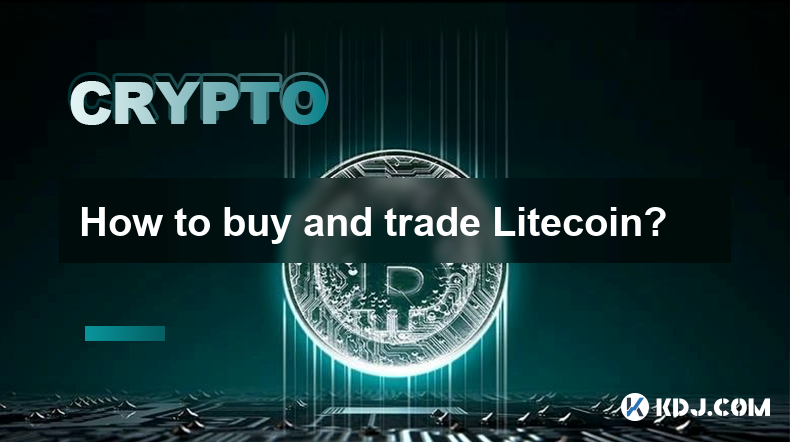
How to buy and trade Litecoin?
Feb 04,2025 at 12:24pm
Key Points:Understand the Basics of LitecoinSelect a Suitable Cryptocurrency ExchangeCreate an Account on the ExchangeFund Your AccountPlace a Buy Order for LitecoinSecurely Store Your LitecoinUnderstand Litecoin TradingHow to Buy Litecoin?1. Understand the Basics of LitecoinLitecoin (LTC) is a decentralized digital currency similar to Bitcoin.Created i...
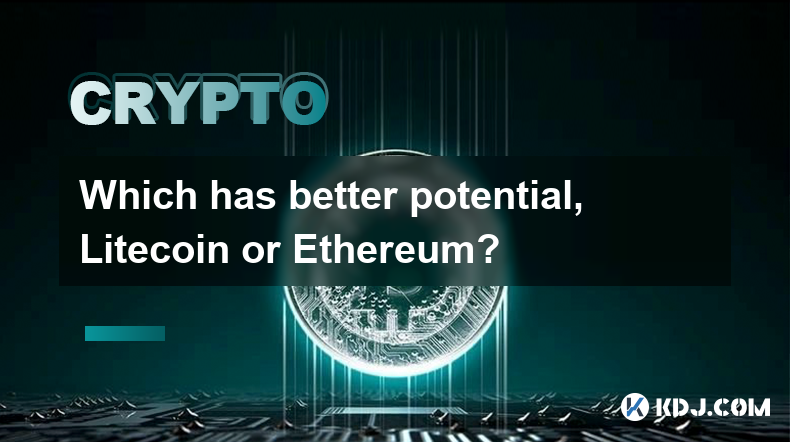
Which has better potential, Litecoin or Ethereum?
Feb 04,2025 at 05:30pm
Key Points:Litecoin and Ethereum are two of the most popular cryptocurrencies in the world.Both coins have their own unique advantages and disadvantages.Litecoin is a faster and cheaper transaction coin than Ethereum.Ethereum is a more versatile platform than Litecoin, and it can be used to create decentralized applications (dApps).Litecoin has a long h...
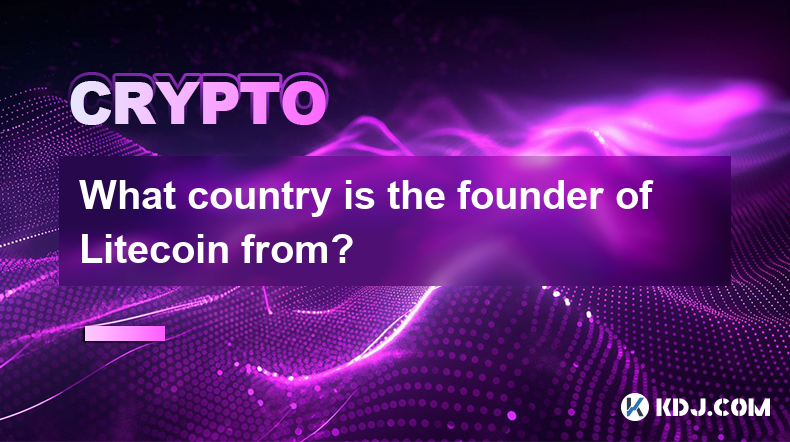
What country is the founder of Litecoin from?
Feb 04,2025 at 05:55am
Key Points:Litecoin's Founder and the Relationship with Charles LeeLitecoin's Technical Features and Similarities to BitcoinLitecoin's Role in the Cryptocurrency Ecosystem and Its PopularityComparative Analysis of Litecoin with Major CryptocurrenciesLitecoin's Community Involvement and PartnershipsArticle Content:Litecoin's Founder and the Relationship ...
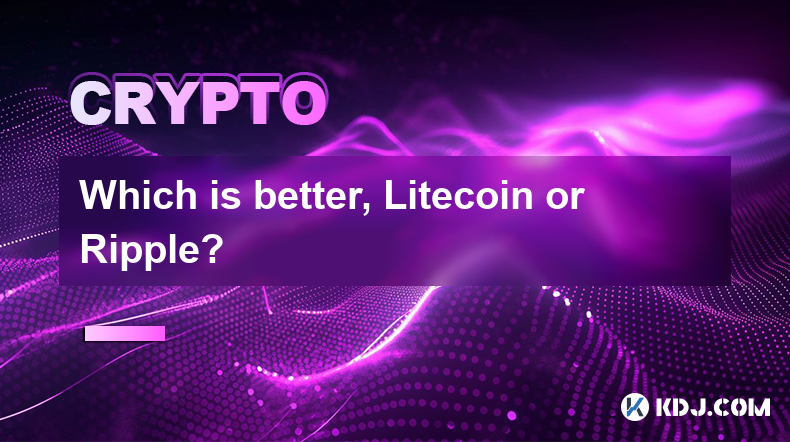
Which is better, Litecoin or Ripple?
Feb 04,2025 at 08:00pm
Key Points:Litecoin: a decentralized, peer-to-peer cryptocurrency based on the Proof-of-Work consensus mechanismRipple: a centralized, enterprise blockchain solution designed for fast and low-cost paymentsDirect comparison of Litecoin vs. Ripple in terms of technology, market capitalization, use cases, and transaction feesPotential benefits and drawback...

When was Litecoin issued?
Feb 04,2025 at 02:36am
When was Litecoin Issued?Key Points:Litecoin's inception and developmentLitecoin's launch date and market dynamicsLitecoin's technical specifications and key featuresLitecoin's Inception and DevelopmentLitecoin, conceived by former Google engineer Charlie Lee, emerged as a fork of Bitcoin in October 2011. Inspired by Bitcoin's revolutionary blockchain t...

Which is better, Litecoin or Tron?
Feb 04,2025 at 10:30pm
Key Points:Similarities between Litecoin and Tron: Decentralized, open-source blockchain platformsDifferences between Litecoin and Tron: Use cases, consensus mechanisms, transaction speedsFactors to consider when choosing between Litecoin and Tron: Investment goals, risk tolerance, specific use casesPotential benefits and drawbacks of Litecoin and Tron:...

How to buy and trade Litecoin?
Feb 04,2025 at 12:24pm
Key Points:Understand the Basics of LitecoinSelect a Suitable Cryptocurrency ExchangeCreate an Account on the ExchangeFund Your AccountPlace a Buy Order for LitecoinSecurely Store Your LitecoinUnderstand Litecoin TradingHow to Buy Litecoin?1. Understand the Basics of LitecoinLitecoin (LTC) is a decentralized digital currency similar to Bitcoin.Created i...

Which has better potential, Litecoin or Ethereum?
Feb 04,2025 at 05:30pm
Key Points:Litecoin and Ethereum are two of the most popular cryptocurrencies in the world.Both coins have their own unique advantages and disadvantages.Litecoin is a faster and cheaper transaction coin than Ethereum.Ethereum is a more versatile platform than Litecoin, and it can be used to create decentralized applications (dApps).Litecoin has a long h...

What country is the founder of Litecoin from?
Feb 04,2025 at 05:55am
Key Points:Litecoin's Founder and the Relationship with Charles LeeLitecoin's Technical Features and Similarities to BitcoinLitecoin's Role in the Cryptocurrency Ecosystem and Its PopularityComparative Analysis of Litecoin with Major CryptocurrenciesLitecoin's Community Involvement and PartnershipsArticle Content:Litecoin's Founder and the Relationship ...

Which is better, Litecoin or Ripple?
Feb 04,2025 at 08:00pm
Key Points:Litecoin: a decentralized, peer-to-peer cryptocurrency based on the Proof-of-Work consensus mechanismRipple: a centralized, enterprise blockchain solution designed for fast and low-cost paymentsDirect comparison of Litecoin vs. Ripple in terms of technology, market capitalization, use cases, and transaction feesPotential benefits and drawback...
See all articles

























































































